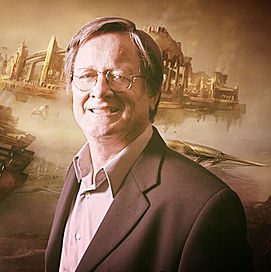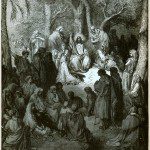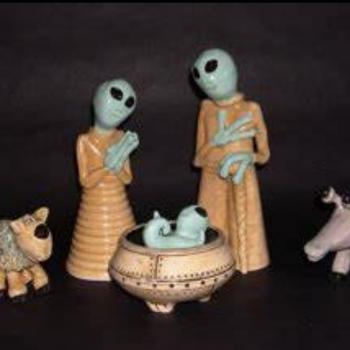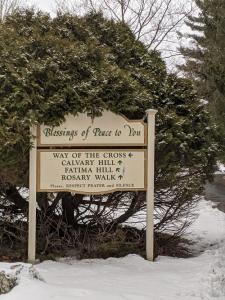*This is the second post in our series of features on the writers, musicians and artists who will be speaking and performing at the Trying to Say God Conference, June 22-24 at the University of Notre Dame.
One of the reasons that Catholic literary culture has become, in the words of Kaya Oakes, a “funeral for multiple corpses,” is that genre fiction, specifically science fiction, fantasy, and weird fiction, are often left out in the cold when these sorts of discussions take place. This glaring omission is strange, considering that Catholic writers have been groundbreaking innovators in these genres.
Walter Martin‘s A Canticle for Leibowitz is considered a science fiction classic on par with Ray Bradbury’s Fahrenheit 451 and George Orwell’s Nineteen Eighty-Four. Canticle takes place in Utah after a nuclear war has blasted the United States. A new order of monks dedicate themselves to keeping knowledge alive in the midst of chaos and disorder.
Gene Wolfe is a genius, under-appreciated not just by Catholics but also by the wider literary world. If there were justice in the world, Wolfe would be famous, and George R.R. Martin would not. Many writers, including Neil Gaiman, consider him to be not only the greatest living Science Fiction writer, but also the greatest living American writer.
There’s also Dean Koontz, who, on top of selling millions of books around the world, has left his mark on two generations of weird fiction and horror writers. Koontz isn’t exactly revered among “high” literary circles–but overlooking him as a major Catholic writer is a mistake if we’re truly seeking to rebuild a Catholic artistic and literary culture. Overlooking genre writers, in general, is a mistake.
This, of course, doesn’t include writers like Mary Doria Russell, author of the Arthur C Clarke award winning novel The Sparrow and its sequel, Children of God. These novels are a wrestling with age old questions of “theodicy”–why does God allow suffering?–through futuristic Jesuits in space.
This is why we invited science fiction and fantasy legend Tim Powers to be one of our keynote speakers at Trying to Say God. Powers has won the World Fantasy Award twice for his novels Declare and Last Call. Disney optioned his book On Stranger Tides for a Pirates of the Caribbean movie. (I recommend you skip the movie and read the book.) His novel The Anubis Gates is one of the seminal works of the sub-genre now known as “steampunk,” sci-fi narratives marked by the use of 19th century fashion and technology–steam power–in anachronistic settings. Along with K.W. Jeter and James Blaylock, Powers is considered one of Steampunk’s founding fathers.
I first came across Powers when I was doing research for the foreword I wrote for the re-release of Charles Williams’s War in Heaven. Powers lists Williams, one of the less famous Inklings, as one of his influences, something I’d not encountered in many writers. So, I bought his book, Three Days to Never, which is basically a “secret” history of prominent historical figures who may have all been into the occult of the supernatural.
Powers often asks the question “what if?” of historical events.
In this, Powers reminds me of what C.S. Lewis said about Williams’s books: “They mix the probable and the marvelous.” They include stories of genies, the dead speaking through radios, time travel through another person’s body, tarot cards, and vengeful spirits. In doing so, he seeks to hint strongly at the world we cannot see or comprehend. They invite us to question what we think we “know” and accept to be true. In this, he has been a literary master and teacher to me in my own paranormal fiction.
Powers doesn’t spend a lot of time obsessing over what it means to be a Catholic writer. He told Ignatius Insight:
“A couple of reviewers thought [Declare] was a pro-Catholic tract, but I think that was mainly because they happened to know I am Catholic. I imagine there is a reflexive prejudice against overtly Christian fiction, but I think fantasy readers can get past that prejudice pretty readily – Lewis’s trilogy is still widely read and admired among fantasy fans, and everybody liked The Exorcist.”
It would be a mistake for a Catholic writer, as I think it’s a mistake for any writer, to have a deliberate theme or message in writing fiction. But I think a well-written, suspenseful fantasy story that was set in a world where Catholicism is real (such as this world, according to me) would please readers.”
Powers shows why the canon of Catholic literature should include science fiction/fantasy/weird fiction, not just books of so-called “magical realism.” Sci-fi and fantasy have become the language of our popular culture.
Comic Con–founded in San Diego in 1970 to showcase comic books and science fi/fantasy related film and television–has become the largest convention of its kind in the world. There are Comic Cons in every major city now. I’m a regular speaker at these conventions, and I can tell you they’re not just playgrounds for CosPlay (costume play–which has become a kind of performance art in its own right) but are full of people discussing literature and story-telling in interesting ways that might befuddle Catholic academics, many of whom are disdainful of the idea that we should mix “serious” reading and writing with play.
On June 24, the final night of the Trying to Say God Conference, I’m moderating a conversation with Tim Powers and Brother Guy Consolmagno, the head of the Vatican Observatory. To my knowledge, this has never been done at any other Catholic conference on the Catholic literary imagination. I’m praying it will be a step foreword as we seek to re-build a Catholic culture of the arts and re-enchant the literary imagination.
We want to open the door and let the genre writers come to the banquet. They might just inject new life into the world of Catholic letters.
Tim Powers will speak (with Bro. Guy Consolmagno and me) at the Trying to Say God Conference on Saturday, June 24, at 7 pm. He’ll sign books after at 8:15. To learn more about the conference, the invited speakers, and how you can participate, visit www.tryingtosaygod.com, follow the conference’s Facebook page, and/or contact us at Sick Pilgrim.













